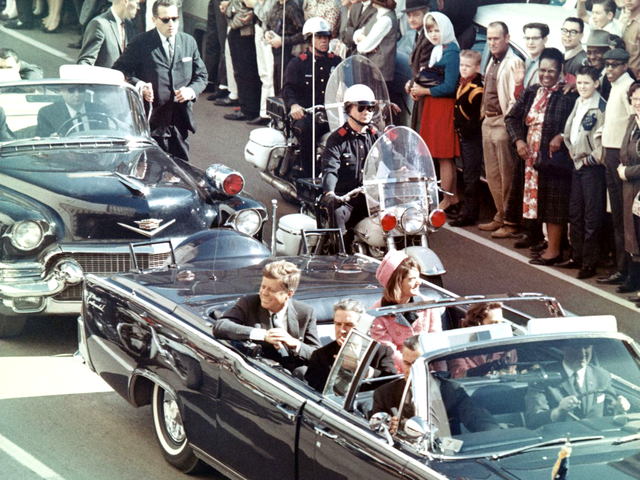RFK Jr., Citing Low Trust in Government, Demands Biden Release More JFK Assassination Documents Ahead of 60th Anniversary
‘What is so embarrassing that they’re afraid to show the American public 60 years later?’ attorney and presidential candidate Robert Kennedy Jr. asks.

Ahead of the 60th anniversary on Wednesday of the assassination of President Kennedy, the slain president’s nephew, attorney and presidential candidate Robert Kennedy Jr., is calling on President Biden to release the remaining records concerning Kennedy’s assassination.
Mr. Kennedy, in a statement, announced he would be circulating a petition demanding that Mr. Biden release the remaining records on his uncle’s assassination. “What is so embarrassing that they’re afraid to show the American public 60 years later?” Mr. Kennedy said in a statement.
Mr. Kennedy’s call comes at a time when, more than sixty years after the assassination, doubts about the official narrative of the event, including whether assassin Lee Harvey Oswald acted alone, continue to resonate among the public.
“A broad majority of Americans continue to believe that Lee Harvey Oswald did not act alone,” Gallup reports, “but rather, that others were involved in a conspiracy to kill the president.”
Gallup adds that 65 percent of Americans “think Oswald worked in concert with others,” compared with 29 percent saying “he was solely responsible,” numbers that “are roughly in line with the previous readings from 10 years ago.”
Credence in conspiracy theories about Kennedy’s assassination were even higher, Gallup reports, “between 1976 and 2003.”
Mr. Kennedy is pointing to low trust in government among the American public as a reason for Mr. Biden to release the remaining records, saying that “John F. Kennedy’s assassination left an indelible scar upon the American psyche.”
“During his term in office, he upheld a vision of America as a nation of peace, a vision that was abandoned after his death,” Mr. Kennedy said. “For the next 60 years, we maintained a military empire, squandering trillions of dollars as our economy hollowed out and our health and infrastructure decayed.”
Mr. Kennedy’s announcement comes a day before the 60th anniversary of his uncle’s assassination, which happened at Dallas on November 22, 1963.
Last year, Mr. Biden’s administration released some 13,000 but not all of the records relating to the Kennedy assassination, a move that critics claimed went against the spirit of the 1992 Kennedy Records Assassination Act.
The records concerning Kennedy’s assassination were slated, per the act, to be released in 2017. However, President Trump refused to comply with the law. According to the National Archives, Mr. Biden has overseen the release of the vast majority of the Kennedy assassination records but not all of them.
In a release from late December, 2022, the National Archives said that there were 515 documents withheld “in full” and 2,545 documents that were released but in redacted versions.
Since late last year, the National Archives has released documents in batches of a few hundred to more than a thousand documents at a time. The National Archives said that its releases are coordinated to ensure that the “continued release of information as specific identified harm dissipates.”
Mr. Kennedy has also raised concerns about his own safety on the campaign trail as the newly independent presidential candidate travels the country.
Mr. Kennedy has called on Mr. Biden to afford him a Secret Service detail to provide extra security on the campaign trail, something that Mr. Kennedy has so far been denied.
The Secret Service is tasked with protecting major candidates beginning 120 days ahead of the presidential election through the election. However, Mr. Kennedy has argued that his family’s history and the recent arrests of an intruder at his home warrant assigning a Secret Security detail earlier than usual.
In a statement to ABC on the topic, the Department of Homeland Security said that “candidates who meet the DHS’s qualifications to be ‘major presidential candidates’ typically start to receive Secret Service protection in the winter before an election and, in some cases, through the primary elections in the spring.”

